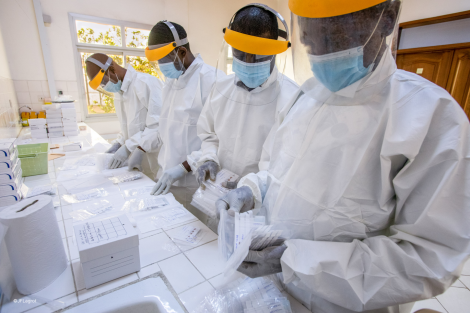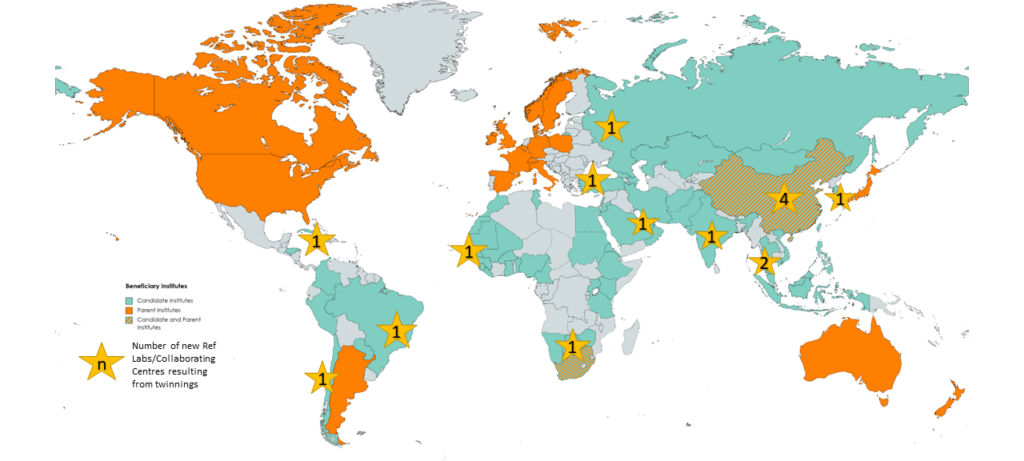Sustainable Laboratories Support
By contributing to disease surveillance, detection and control, laboratories support health systems and reduce risks posed to animal, human and environmental health. Sustainable Laboratories missions provide an in-depth analysis of the efficiency and sustainability of the national veterinary laboratory network and provide elements for national authorities to develop the case for investment.

The critical need for sustainable veterinary laboratories
Veterinary Services need to have access to high-quality diagnoses to make informed decisions that impact animal, human and environmental health, as well as livelihoods. To this end, they require a sustainable network capable of accurately identifying and reporting diseases and other sanitary hazards.
A functional and sustainable veterinary diagnostic laboratory network requires a high level of technical competence, a robust management framework—particularly for quality assurance, safety, and security—as well as appropriate equipment, consumables, and reagents. It also requires strong support from the various structures that are part of the national health system, including surveillance mechanisms and disease control programmes. Veterinary laboratories are part of a whole health ecosystem, in which economic sustainability and networking with national, regional and international facilities represent essential needs.
To varying degrees, veterinary laboratories across the world face challenges in meeting these critical requirements. Poorly adapted infrastructure, inappropriate allocation of funds, lack of trained staff, insufficient sample flow, and systemic management deficiencies: all these factors only increase the risk of accidental or intentional release of pathogens and pose a threat to health at every level.
Building strong laboratory capacity
To support the capacity of veterinary laboratories, WOAH offers several solutions to its Members through the PVS Pathway, namely, the Sustainable Laboratories missions and the Laboratory Twinning Programme.
Addressing gaps through Sustainable Laboratories missions
Sustainable Laboratories missions provide an in-depth analysis of the efficiency and sustainability of the national laboratory network. Much more comprehensive than a single laboratory assessment, they examine the national veterinary laboratory infrastructure to develop a case for investment and improvement. These missions can be held either in-country or virtually.
A team of experts is commissioned to thoroughly review the needs in terms of physical, human and financial resources and evaluates overarching costs and requirements for sustainability to maintain operations at a targeted level and achieve business continuity. As an outcome of the mission, strategic recommendations are made based on current and future demand for laboratory services, which should ensure that the needs of the Veterinary Services and the veterinary domain can be met.
The approach analyses existing and prospective demand and the current offering of laboratory services, as well as a range of organisational, financial and sustainable management options. The findings of the report aim to facilitate sound decision-making for an efficient, fit-for-purpose national laboratory network, including official delegation to private laboratories. They also include an assessment of the level of personnel, infrastructure, equipment and operational resources, based on national diagnostic needs.
Related Articles
Sharing expertise through laboratory twinning
Through laboratory twinning, WOAH aims to foster a more balanced geographical distribution of advanced expertise, allowing more countries to access high-quality diagnostic testing and technical knowledge within their own region, thus facilitating early disease detection or confirmation and rapid control.
Each Twinning Project directly links an existing WOAH Reference Laboratory or Collaborating Centre (referred to as the ‘Parent’ institute) with a Candidate institute wishing to improve its capacity and scientific expertise. Knowledge and skills are shared over a defined project period through staff exchanges, training of key personnel, quality assurance, biosafety reviews and proficiency testing. WOAH Laboratory Twinning Projects provide mutual benefits for both institutions, including the creation of joint research opportunities, the establishment of research networks, and sustainable capacity building. The aim is to support the application of the Candidate institute to become a WOAH Reference Centre, with benefits at country and regional level.
Thanks to the WOAH Laboratory Twinning Programme, more countries have access to high-quality diagnostic testing and improved technical capability, thus facilitating early disease detection and its rapid control.
-
Guidelines
A guide to Laboratory Twinning projects
.pdf – 1 MB See the document -
Factsheet, Situation
List of Laboratory Twinning projects
.pdf – 187 KB See the document
Global distribution of WOAH Laboratory Twinning projects
How can Members engage in the process?
Sustainable Laboratories support
National Delegates can send a request for a Sustainable Laboratories mission based on the recommendations on specific competencies/areas included the PVS mission report.
Laboratory Twinning Programme
All Members can apply to the programme, even if they have not been involved in earlier stages of the PVS Pathway. Members can:
Read our dedicated guidelines
Contact WOAH
Prepare a proposal using the appropriate template, available on request.
More information
-
Sustainable Laboratories
Contacts
Sustainable Laboratories support
Jennifer Lasley
Senior Programme Coordinator,
PVS Pathway and WHO/IHR connections
Laboratory Twinning Programme
Mariana Marrana
Programme Manager,
Laboratory Twinning
[email protected]

